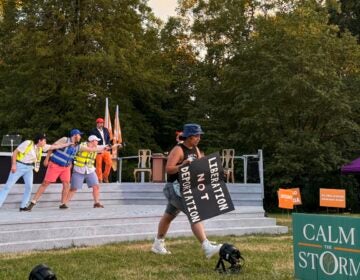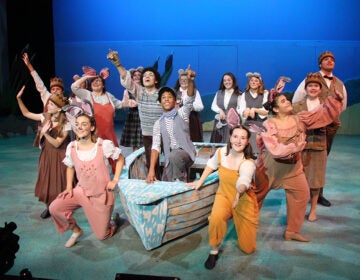New Philly play shows gun violence through the eyes of teenagers
The new play “Childhoodslost Chronicles” features teenage actors, showing gun violence through their eyes. It runs this weekend at the Arts Bank on South Broad Street.

Playwright and director Bilal Islam watches a rehearsal of Childhoodslost Chronicles. (Emma Lee/WHYY)
There are 19 characters in the new play “Childhoodslost Chronicles,” 15 of which are teenagers.
But the central character is a gun.
Specifically a ghost gun, a homemade firearm made from mail-order parts with no serial number, making it untraceable. In the play, it changes hands many times because of curiosity, or protection, or aggression.
Playwright Bilal Islam stays true to theater’s “Chekhov’s Gun” rule, which insists that if a gun is introduced into a play it must eventually go off.
This ghost gun will go off. It has an unexpected target, but with predictably tragic results.
“I think it’s very compelling with everything that’s going on in society today, with us being at 100 homicides [this year] in not even 100 days,” Islam said. “These ghost guns are out here, and they’re giving these licenses away to anybody.”
While the script is not based on real stories of gun violence in Philadelphia, it is informed by them, even anticipating them. Bilal points to the recent news of a 12 year old boy holding a stolen 9mm handgun, who allegedly fired at Philadelphia police then was shot in the back and killed.
In the play, the ghost gun is first seen in the hands of a pre-teen boy, who is showing it off to a friend after finding it abandoned in a trash can. The script was written six months ago.
“Childhoodslost Chronicles” will be performed three times on Friday and Saturday at the Arts Bank, a performance space on South Broad Street in Philadelphia.
It’s a production of the Childhoodslost Foundation, a youth mentorship program based in Germantown. Under its slogan “Art with Purpose,” the foundation has created 27 original staged productions in the last 11 years, according to co-founder Kaliek Hayes. His shows feature casts of local teenagers, all of whom are paid to perform.
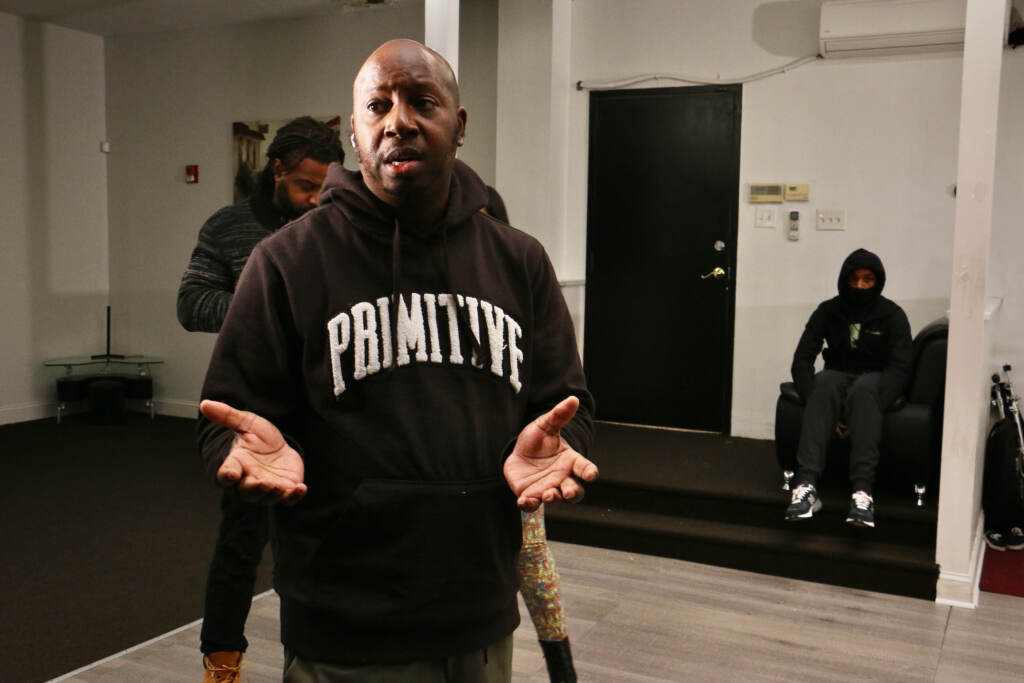
Hayes describes “Childhoodslost Chronicles” as a kind of roadmap for young people: showing them situations they might face – involving violence, bullying, and abuse – and suggesting best practices to handle them.
“It’s easy to be reactionary,” he said. “It’s a whole different thing to be prepared.”
Hayes describes the harms to which Black youth are subjected – in particular Black boys – as “generational genocide.”
“Personally, I believe that Black and brown – especially our Black and brown boys – it is an attack against them,” he said. “Things are happening directly to them, for them not to be successful in life, in school, in a lot of areas. It is my part as a Black man to do something to speak to that.”
One of the performers is Nya-Jolie Walters, 16, who is excited to have the chance to play a “mean girl.” She said the play gets into some real-life issues.
“This play targets a lot of areas. It shows realness and what people might actually face in reality,” she said. “It gets to the point. It’s enough where people can learn from it.”
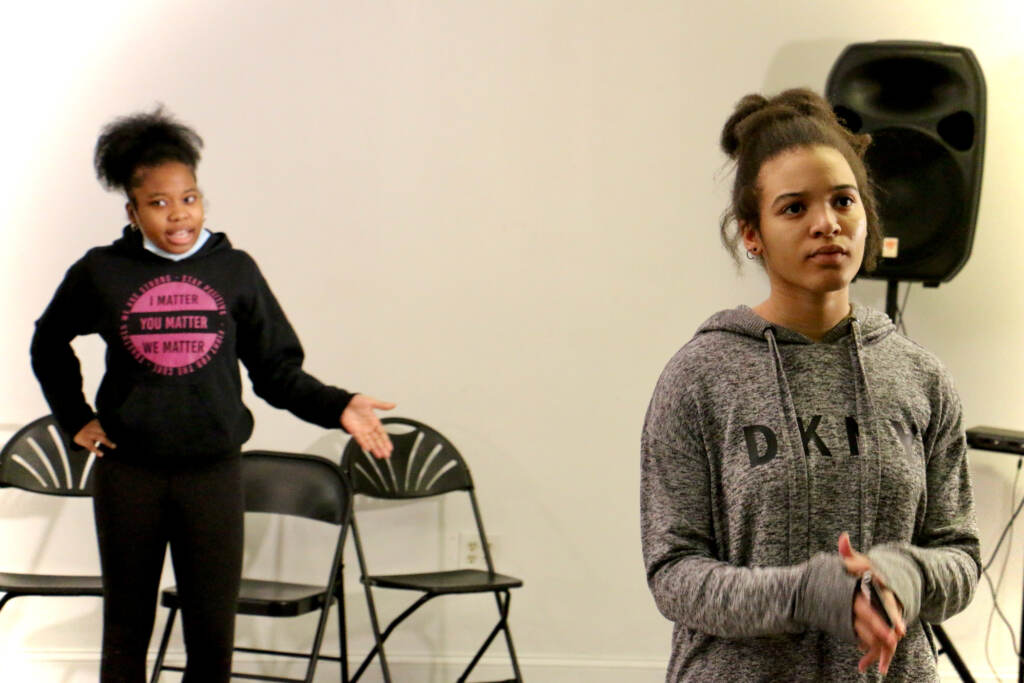
The performers are given a script to learn, but also given free reign to change lines in order to make them sound authentic to their own experience.
“I’m old, so they be like, ‘We don’t say that no more,’” laughed Islam, 60.
“The beauty of this is once we get them comfortable – you do your thing because y’all know what’s really going on,” Hayes said. “We try to keep our pulse on the issues, but what we think we know, they know, because it’s happening to them.”
In one scene, a young Black teenager angrily puts the barrel of a gun to the forehead of his estranged father, while his mother begs him to stand down.
The teenager is played by Nadhir Mapp, 15, who said even if an audience member has never threatened to shoot his father, most will probably be able to understand, directly or indirectly, an explosive relationship with an absentee parent.
“It’s, like, dad issues and how he wasn’t there,” Mapp said. “The kind of things that a lot of kids – or a lot of Black kids nowadays got to deal with.”
“It’s kind of amazing, what we do,” he said. “All of our stories are connected to real life issues. So that makes it all more fun.”
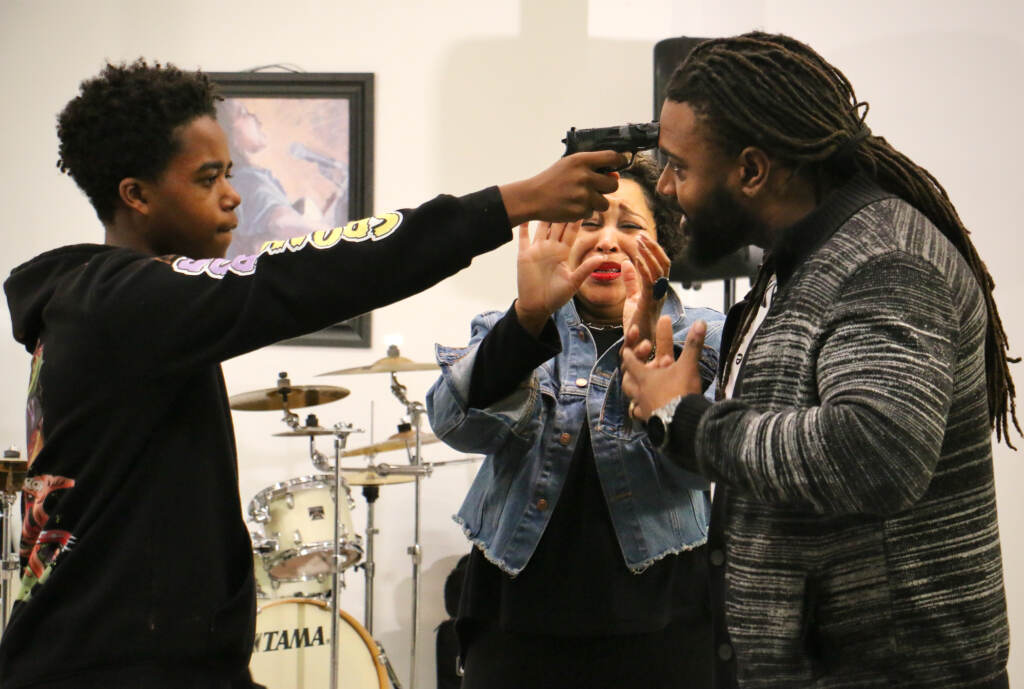
The play is structured as a series of scenes populated by different sets of characters, who do not appear to intersect at first, but as the action unfolds it becomes clear that everyone is interrelated.
Islam said he was influenced by the 2004 film “Crash,” with intersecting stories of racism and police violence in Los Angeles. Childhoodslost shows the impact of gun violence going beyond the person who pulled the trigger and the person who was shot. It’s a trauma that ripples throughout a community.
“The circle, it just closes,” Islam said.
Islam and Hayes had written produced another production several years ago called Childhoodslost, with a similar structure. That play performed in 2013 focused on child abuse and sex trafficking. Now renamed “Childhoodslost Chronicles,” this iteration is focused on gun violence and the damaging effects of social media.
“We tell the dark stories, stories that you only see on the news,” Hayes said. “We tell them because they need to be told. It gives voice to all the young people in the building. Now they feel empowered to really be a part of the conversation.”
The performances at the Arts Bank this weekend will include a question and answer period after the play, and Hayes said a child psychologist will be present should any audience members be emotionally overwhelmed or feel a need for professional assistance.
“Kaliek and I was just talking: we’ve got to come up with a happy ending. Like, somewhere down the line. But it’s hard because right now there aren’t any happy endings,” Islam said. “Everybody can’t be [Tyler Perry’s] Madea. If you want that, then go see that. These childhoods that are getting lost, someone has to talk about it.”
 WHYY is one of over 20 news organizations producing Broke in Philly, a collaborative reporting project on solutions to poverty and the city’s push towards economic justice. Follow us at @BrokeInPhilly.
WHYY is one of over 20 news organizations producing Broke in Philly, a collaborative reporting project on solutions to poverty and the city’s push towards economic justice. Follow us at @BrokeInPhilly. 
Saturdays just got more interesting.
WHYY is your source for fact-based, in-depth journalism and information. As a nonprofit organization, we rely on financial support from readers like you. Please give today.




